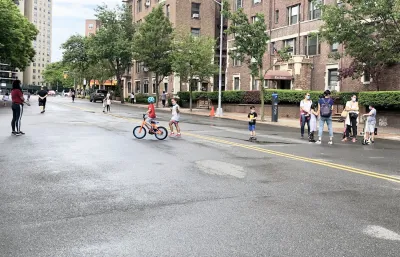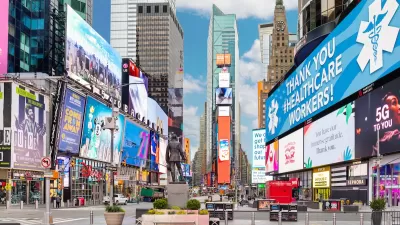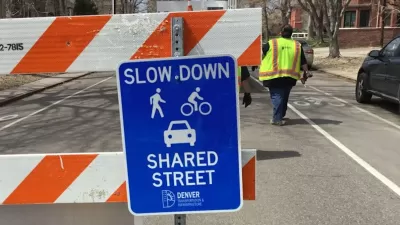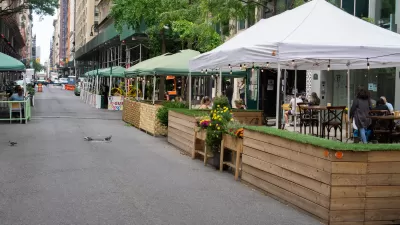The number of open streets projects has dropped year after year as volunteer groups struggle to fund and staff them.

New York City’s open streets, like its outdoor dining patios, continue to wane with little support from city officials. “The downward trends of the open streets over four years confirm Streetsblog's extensive reporting on the steady rollback of operating days and hours across the city,” writes Kevin Duggan in Streetsblog NYC.
According to city Comptroller and mayoral candidate Brad Lander, “Volunteer groups cannot sustain the work to successfully operate open streets without more resources, support, and clear guidelines from the city.” Lander called on the city to expand and support the program.
The average number of open streets in the city dropped from 326 in 2021 to 232 in 2024. This year, the program is expected to roll out in 127 locations. “The average length of city open streets dropped by nearly a third (32 percent) between its peak in 2020 and 2024, and operating hours per week fell by 40 percent, according to the comptroller's analysis.” The projects that remain are concentrated in Manhattan, which consistently has the highest number of open streets compared to the other boroughs.
Lander’s report recommends bringing the program to all neighborhoods and creating a “baseline reliable public funding” source to support neighborhood volunteer groups with setup and equipment costs. Recently, a group of Open Streets organizers requested $48 million from the city over the next three years. According to Lander, “If you provide resources to enable open streets to happen, not only will you have a beautiful open street, but you’ll be supporting the growth of a neighborhood safety institution, [New Yorkers] would think that $48 million was a bargain.”
FULL STORY: Open Streets Are Shrinking Thanks to ‘Lukewarm’ City Support: Lander

Planetizen Federal Action Tracker
A weekly monitor of how Trump’s orders and actions are impacting planners and planning in America.

Map: Where Senate Republicans Want to Sell Your Public Lands
For public land advocates, the Senate Republicans’ proposal to sell millions of acres of public land in the West is “the biggest fight of their careers.”

Restaurant Patios Were a Pandemic Win — Why Were They so Hard to Keep?
Social distancing requirements and changes in travel patterns prompted cities to pilot new uses for street and sidewalk space. Then it got complicated.

California Homeless Arrests, Citations Spike After Ruling
An investigation reveals that anti-homeless actions increased up to 500% after Grants Pass v. Johnson — even in cities claiming no policy change.

Albuquerque Route 66 Motels Become Affordable Housing
A $4 million city fund is incentivizing developers to breathe new life into derelict midcentury motels.

DC Area County Eliminates Bus Fares
Montgomery County joins a growing trend of making transit free.
Urban Design for Planners 1: Software Tools
This six-course series explores essential urban design concepts using open source software and equips planners with the tools they need to participate fully in the urban design process.
Planning for Universal Design
Learn the tools for implementing Universal Design in planning regulations.
Heyer Gruel & Associates PA
JM Goldson LLC
Custer County Colorado
City of Camden Redevelopment Agency
City of Astoria
Transportation Research & Education Center (TREC) at Portland State University
Camden Redevelopment Agency
City of Claremont
Municipality of Princeton (NJ)





























